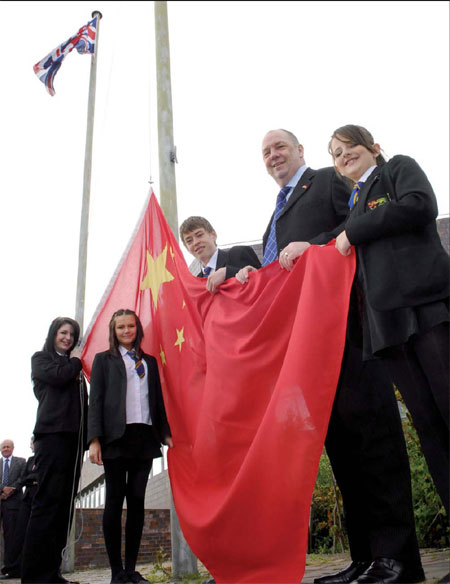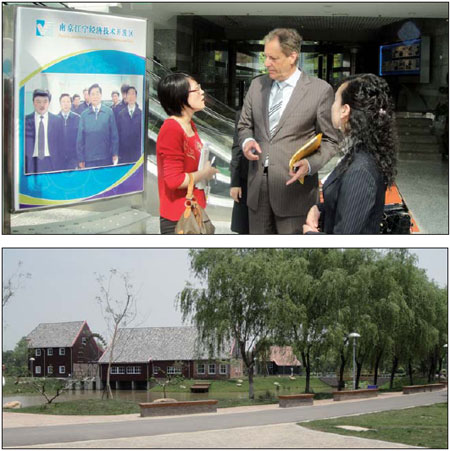A twin-win situation
Updated: 2013-03-15 09:03
By David Bartram for China Daily and Ji Xiang (China Daily)
|
|||||||||||

|
Clockwise from top: Representatives from Eindhoven's business community visit Nanjing to promote the city; Sunderland city council leader Paul Watson, with local schoolchildren, marks the city's friendship agreement with Harbin; and the Van Gogh Friendship Park in Nanjing. Provided to China Daily |
Partnerships between Chinese and European cities bring lasting benefits to both sides in economic and cultural spheres
The locals are accustomed to cold winters in Sunderland, a small post-industrial city in the northeast of England, but nothing quite as extreme as the -25 C regularly experienced in Harbin, in the far north of China.
Exchanging tips on how to beat the cold is just a peripheral benefit the two cities have enjoyed since signing a friendship agreement in 2009. The deal looks to build economic, educational and cultural ties between two cities almost 8,000 kilometers apart.
"We very much believe that as a city we have to forge links internationally and look to global opportunities," says Paul Watson, leader of the Sunderland City Council. "The links we are developing with Harbin are very much part of this approach as we build relationships that we hope will generate economic and educational benefits for our cities."
Sunderland's agreement with Harbin, in Heilongjiang province, is part of a wider trend among Europe's towns and cities, which are increasingly turning toward China in search of friendship, twinning or sister-city arrangements.
City twinning gained popularity across Europe after World War II, with most arrangements between European cities. Today, almost three-quarters of the UK's approximately 2,000 formal twinning arrangements are with counterparts in France or Germany, according to the Local Government Association.
|
||||
While there is an obvious economic incentive to such arrangements, the scope of friendship agreements is also widening. These days, sister-city partnerships also tend to include civic, cultural, educational and research exchanges.
Sunderland's friendship agreement with Harbin, for example, has a strong focus on education. The city sent a delegation of head teachers to Harbin in 2009 to establish school partnerships. Since then, pupils from schools in the two cities have been holding video conferences and exchange e-mails and letters. Sunderland schoolchildren have visited Harbin in each of the past two years.
"We feel it is important to help prepare our children and young people to be able to participate fully in today's global society and economy," says Watson. "The cultural and educational links with Harbin help to increase their understanding of other cultures.
"In the longer term it also provides them with important skills and inter-cultural understanding, which employers will be looking for as they compete in an increasingly global economy."
Since September 2011, Harbin University has interacted with the University of Sunderland by phone, e-mail and visits.
"Hopefully, the cooperation with the University of Sunderland can help us learn about the advantages and features of the university and have a better understanding of our own weak points to provide experience and direction for future development," says Chen Si, who works for the dean's office at Harbin University.
Harbin University's academic cooperation includes teacher and student exchanges and joint education programs, particularly in its key majors of software engineering, art design and animation.
Related Stories
Sisterly relations at a stretch 2013-03-15 09:03
Today's Top News
List of approved GM food clarified
ID checks for express deliveries in Guangdong
Govt to expand elderly care
University asks freshmen to sign suicide disclaimer
Tibet gears up for new climbing season
Media asked to promote Sino-Indian ties
Shots fired at Washington Navy Yard
Minimum growth rate set at 7%
Hot Topics
Lunar probe , China growth forecasts, Emission rules get tougher, China seen through 'colored lens', International board,
Editor's Picks

|

|

|

|

|

|







